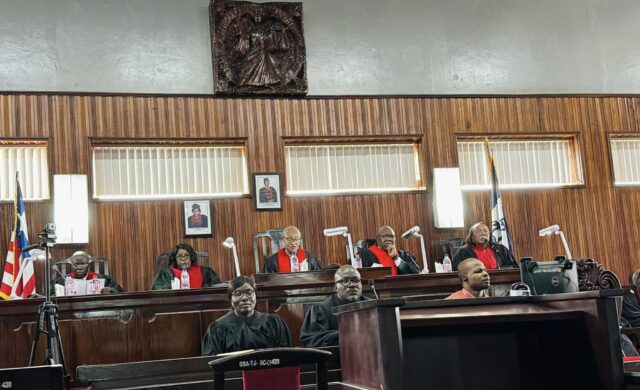
Claim: “Women Dominate Supreme Court Bench.”
When Liberia celebrated its 177th Independence Day on July 26, 2024, Nyonblee Karnga-Lawrence, Senate Pro-Tempore, speaking on behalf of the legislature’s women’s legislative caucus, stated that the Supreme Court is one of the government institutions currently dominated by women.
Karnga-Lawrence defied male chauvinists and became the first elected woman pro-temp of the Liberian Senate.
About the Supreme Court of Liberia:
According to Article 3 of the 1986 Constitution, Liberia is a Republican nation with three branches of government, namely, the legislative, executive, and judiciary.
It ensures separation of powers and checks and balances, with no one branch having greater authority than the other.
Chapter VII of the Liberian Constitution outlines the Judiciary Branch’s powers, vested in the Supreme Court and subordinate courts established by the Legislature.
The judicial branch is headed by the Supreme Court, which is presided over by the Chief Justice. It has a five-member bench consisting of a Chief Justice and four Associate Justices, with the most senior Associate Justice serving the longest.
The current justices include Sie-A-Nyene G. Yuoh, Jamesetta Howard-Wolokollie, Yussif D. Kaba, Yamie Gbeisay, and Ceaineh Clinton-Johnson.
Those names consist of three women and two men, with Sie-A-Nyene G. Yuoh being the chief justice and head of the Supreme Court.
The Supreme Court has original jurisdiction in cases involving ambassadors, ministers, and countries as parties, as well as final appellate jurisdiction in cases from courts of records, rulings of Supreme Court Justices, and administrative agencies.
The Chief Justice and Associate Justices have equal voting rights in the adjudication process, with the Chief Justice casting the decisive vote.
No Justice of the Supreme Court can sit on cases related to remedial or extraordinary writs or lower court judges. The Court holds two terms annually.
What does the dominance on the bench mean for Liberian women?
Globally, Liberia is sixth from the bottom of 162 countries on the Gender Inequality Index. Women are underrepresented in elective office in Liberia—among the lowest in the world,” according to a 2022 World Bank report.
In the most recent elections, women won just 10.7 percent of seats, a fall from 11 percent in 2017, which was itself a record low. It is far below the average for Africa, of 26 percent.
President Joseph Boakai has repeatedly pledged an inclusive government, but as of March 2024, of a total of 237 appointments made so far, 180, or one in every three, are men. Just 57 women, or one in every four appointees women, according to UN-Women and Sister-Aid Liberia March 2024 data.
Frances Greaves, former head of National Civil Society Organizations, said it is an added advantage for women to persevere.
“For a branch to be led by three women, it is an added advantage for women in the legal field; these women did not get the job on a silver platter; they got the job through their hard work, and the newly appointed justice as a former judge on the gender-based violence issue brings a wealth of experience to the bench,” she said.
Greaves wants women appointed to see it as an opportunity for young women to beat the odds and for those aspiring to persevere to be able to emulate these women.
Additionally, Loretta Pope-Kai, current chair for the National Civil Society in LIberia, said the appointment of female justices to the Supreme Court of Liberia is a significant development that has the potential to promote gender equality, enhance the representation of women in the justice system, and improve access to justice for all.
“It signals a step towards a more inclusive and equitable judicial system that upholds the rights and dignity of all citizens, regardless of gender. Enhanced access to Justice for Women, female justices are more likely to understand and advocate for issues that disproportionately affect women, such as gender-based violence, discrimination, and women’s rights.”
She said their presence on the Supreme Court can help ensure women’s voices are heard and their rights respected.
Conclusion: With Yuoh as the current head of the Supreme Court and two other female associate justices, Karngar-Lawrence is correct that women dominate the Supreme Court. On June 21, 2024, Boakai appointed Clinton-Johnson, increasing the number of women to three.




